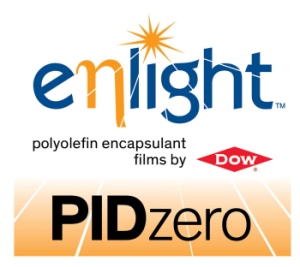Photovoltaic (PV) modules continue to gain momentum as a viable renewable energy source in the marketplace. With reputable ENLIGHT™ Polyolefin Encapsulant Films for PV modules, Dow Packaging & Specialty Plastics, a business unit of Dow, has established itself as an industry leader for polyolefin encapsulants products that produce high-performance PV systems.
Recently, PV modules with ENLIGHT™ Polyolefin (PO) Films achieved results that demonstrate zero potential induced degradation (PID) loss when put through third-party testing standards that simulated over 25 years of product deterioration, setting a new bar for industry expectations with PID zero.
 Dow introduces PID zero performance with ENLIGHT(TM) Polyolefin Encapsulant Films (Graphic: Business Wire)
Dow introduces PID zero performance with ENLIGHT(TM) Polyolefin Encapsulant Films (Graphic: Business Wire)
PID occurs when a module’s voltage potential and ion mobility degrade the solar cells and reduce the module’s power output capacity. PID has been a leading benchmark to evaluate the effectiveness of PV systems when put under various types of stresses that may affect performance, including high temperatures, humidity, moisture and high voltage. While there are reputable testing bodies like the International Electrotechnical Commission (IEC) and ASTM International, current testing parameters only address the risk of early field failure rate of PV modules and there are no strict industry-wide standards that test performance during a modules’ 25-year lifespan.
“Dow’s unique back-integrated polymer expertise has enabled ENLIGHT™ encapsulant films to have industry-leading volume resistivity, which is widely attributed to PID resistance,” states Sang-Ho Kang, global business leader, Dow Photovoltaic. “We determined that utilizing third parties to apply IEC’s accelerated testing methods at levels that would simulate 25 years in a sunny and humid environment was the best way to show the unrivaled performance of our technology. The results were even better than we had expected— uncovering a new level of risk mitigation with PID zero.”
As a leader in polyolefin material science for more than 50 years, Dow has the expertise and scientific knowledge to help propel the PV industry forward. Fraunhofer Center for Silicon Photovoltaics (CSP) and Photovoltaik Insitut Berlin (PI-Berlin) were both tasked with validating the performance of PV modules with ENLIGHT™ PO Encapsulant Films for 500 hours at 85 degrees Celsius, 85 percent relative humidity and -1000 volts. Both firms confirmed that Dow ENLIGHT™ films possess high volume resistance, has low moisture vapor transmission rate and demonstrates zero degradation of power from PID-- exceeding the industry accepted standard of PID free (≤5 percent energy loss).
Dow is the first company to qualify for a PID certificate for encapsulation materials – PID Block – a new program by PI Berlin for the confirmation of superior PID suppressing properties of encapsulation materials. Third-party validation from Fraunhofer CSP and PI-Berlin concluded that ENLIGHT™ PO Films offer performance that exceeds PID-free standards and established a level Dow recognizes as PID zero. That, combined with the recent device patents for PO encapsulant films in PV modules Dow received in the US and the EU, provides unique opportunity for modules makers and other value chain members to create proven, high performance PV systems. Those two regions in addition to the device patents already issued in China and Philippines makes Dow one of the industry’s first to receive global device patents for PO encapsulant films used in PV modules.
Those visiting the SNEC International Photovoltaic Power Generation Conference & Exhibition, May 20-22, in Shanghai, can view modules integrated with PID zero technology at various customer booths. To learn more about Dow ENLIGHT™ Polyolefin Encapsulant Films and PID zero, please visit www.PIDzero.com.